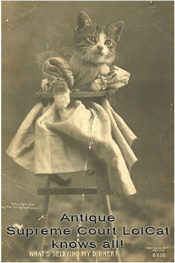Welcome back from Turkey Day, y’all! Hopefully you are all full and hungover today, which is as it should be. (Just a quick plug…Badgers are going to the Rose Bowl, baby! Woo!)
I’m interrupting our Teh Commerz Clawz series in the interest of doing something more immediately relevant that I’m being bombarded with pretty much everywhere this morning…In other words, the entire WORLD is freaking out right now, all because of a nice little site called Wikileaks.
In their own words, Wikileaks’ goal is to “bring important news and information to the public.” In other words, they provide a place for the Deep Throats and Daniel Ellsbergs of the world to talk. And they’ve gotten their lovely hands on almost 40 years worth of confidential U.S. government diplomatic cables, the kind that historians normally don’t get to see until all the people in them are dead or so far retired that it doesn’t matter who knows what they did or didn’t do.
Most people are ecstatic about this. Expose government corruption? Let’s do it! Find out what’s really going on for once? Boo-freakin-yah! Let’s get to it! The New York Times, The Guardian in Britian, El Pais in Spain, Le Monde in France, and Der Spiegel in Germany have all been given access to these documents before they hit the web and the revelations are starting to come fast and furious. The government is obviously incredibly worried, invoking that now common phrase “threat to national security.” Which honestly, many of us may have started to look at as a joke. It’s been used one too many times.
I personally think Wikileaks is doing a great service, and is an incredibly innovative way to use the Internet and new media in the service of truth in journalism. Also, check out the headlines from The Guardian. It’s always insightful to see how other countries view our government.
But, even with the First Amendment seemingly giving the newspapers the right to do this, how can the New York Times blithely publish documents that might threaten national security?
The reason is something we’re all at least vaguely familiar with, even though it was long before my time: the Vietnam War. Now, to get a complete history here’s the Wikipedia link (oh, the irony), but the basic idea is that Secretary of Defense Robert McNamara commissioned a giant history of the Vietnam War in 1967. It was classified as Top Secret, and only 15 copies were made. Even the President had no idea it was being compiled. Basically, the whole report showed that we’d been muddling around in Vietnam with no idea what we were doing. As many vets had already told us, the whole thing was a mess.
In 1969, a young man named Daniel Ellsberg, who had worked on the Pentagon Papers in 1967, decided he was against the war and it was time to blow the lid off this Popsicle stand. He eventually took his copies to The New York Times. The Times, never wanting to miss a great scoop, decided there was no way this wasn’t getting published. Their legal counsel said no, but outside council said what we all now take for granted: the First Amendment makes this ok.
Good old Nixon tried to stop them with an injunction, citing executive authority, national security, and lots of other -ity words meant to scare the crap out of the Times and the lower federal judges. As expected, this quickly wound its way to the Supreme Court in New York Times Co. v. United States.
The New York Times argued that the government could not use prior restraint to stop them from publishing these documents. There has always been a high level of scrutiny applied to prior restraint of the press, even in times of war. In 1951, Dennis v. US had established the grave and irreparable danger standard. This standard holds the government accountable for proving that “grave and irreparable danger to the American people” would result from the publication of documents before they could be eligible for prior restraint.
The Supreme Court held for The New York Times, saying in what was for them an extremely brief decision that this vague word “security” was not enough to stop the press from publishing these documents. This precedent continues to be used now, and would definitely be used if there was a challenge to the press publishing sensitive government documents again.
Commerz Clawz resumes tomorrow!

